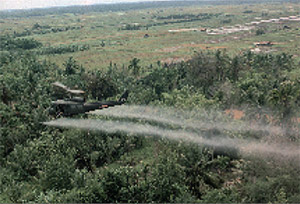Investigating Agent Orange Exposure and Prostate Cancer

Dioxin is a highly toxic substance found in Agent Orange and some other herbicides. During the Vietnam War, the U.S. military sprayed large amounts of herbicides, including Agent Orange, in Vietnam, Laos, and other places to clear vegetation. Some troops were exposed to Agent Orange while serving in the military in the 1960s and early 1970s. Concerns that Agent Orange exposure could cause health problems has led to a number of scientific studies, including a possible link between the herbicide and prostate cancer.
The Institute of Medicine of the National Academy of Sciences has concluded in its reports that there is limited/suggestive evidence of a positive association between prostate cancer and exposure to herbicides used in Vietnam. Yet, a 2014 critical review concluded that the published literature does not offer a consistent or convincing evidence of a causal relationship between exposure to Agent Orange and prostate cancer.1 Recent studies have found mixed results regarding the link.
A new study investigated the association between Agent Orange exposure and long-term prostate cancer outcomes in 333 men undergoing radical prostatectomy for prostate cancer.2 After a median follow-up of 85 months, the researchers found that Agent Orange exposure was not associated with worse preoperative characteristics such as elevated PSA levels, nor with biochemical recurrence, secondary treatment, metastases or prostate cancer death.
However, a 2013 study of 2,720 veterans who underwent biopsy found that Agent Orange exposure was associated with a 52% increase in the overall risk of detecting prostate cancer and a 74% increase in the risk of highgrade prostate cancer.3 Agent Orange exposure was also associated with a 2.1- fold increase in the risk of detecting prostate cancer with a Gleason score ≥8.
- Eur J Epidemiol. 2014 Oct;29(10):667-723. doi: 10.1007/s10654-014-9931-2. Epub 2014 Jul 27.
- Urol Oncol. 2015 Jul;33(7):329.e1-6. doi: 10.1016/j.urolonc.2015.04.012. Epub 2015 May 18.
- Cancer. 2013 Jul 1;119(13):2399-404. doi: 10.1002/cncr.27941. Epub 2013 May 13.











